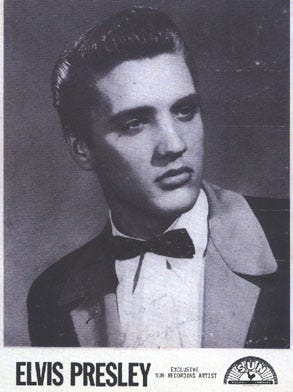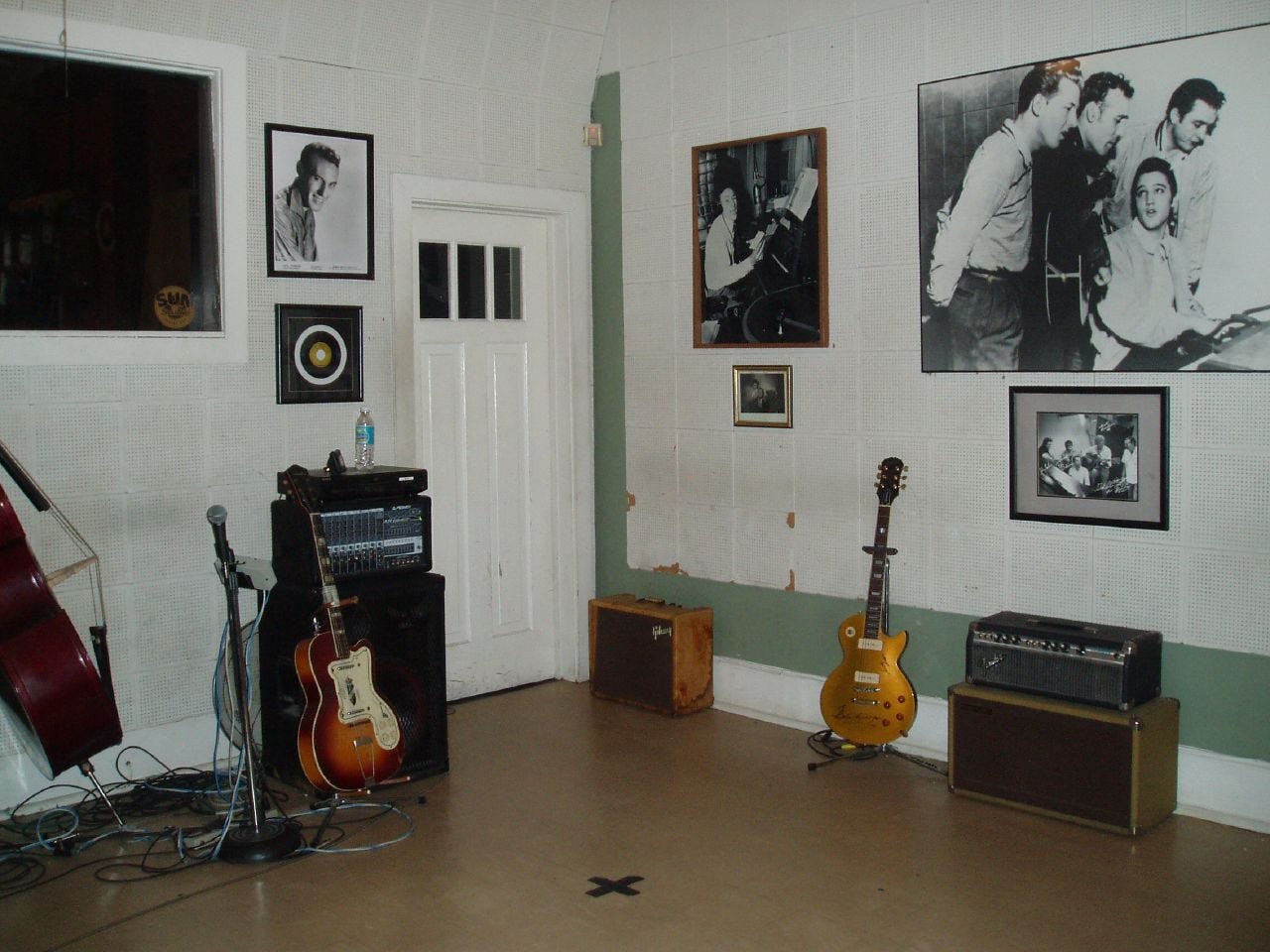MEMPHIS — Their Fourth of July flopped. They kept trying until the Big Bang of Rock exploded on July 5, 1954.
Bono, gifted with the perspective of history, culture, artistry, and a poet’s soul, explains the meaning of that July 5 moment better than anyone:
“Elvis Presley is like the ‘Big Bang’ of Rock ’n’ Roll,” Bono concluded. “It all came from there, and what you had in Elvis Presley is a very interesting moment because, really, to be pretentious about it for a minute, you had two cultures colliding there.”
Bono explains how the crash created the Big Bang of Rock, like mixing peanut butter and chocolate into one new taste, no one had ever imagined before:
“You had a kind of white, European culture and an African culture coming together — the rhythm, okay, of black music and the melody chord progressions of white music — just all came together in that kind of spastic dance of his. That was the moment. That’s really it. Out of all that came the Beatles and the Stones, but you can’t underestimate what happened. It does get back to Elvis.”
That one little song, “That’s All Right,” exploded before “going viral” was a thing. So 50 years later, on July 5, 2004, Elvis Radio launched to mark that turning point in cultural history.
Nearly two decades after the start of Elvis Radio, Elvis — and his impact on culture are bigger than ever. But it started small, at a tiny recording studio smaller than a typical fast food drive-thru.
Bono would record in that same little studio in 1987 as countless others have through the years (Sun is a museum all visit in the day and a studio after hours). Bono explained:
“Out of Tupelo, Mississippi, out of Memphis, Tennessee, came this green, sharkskin-suited girl chaser, wearing eye shadow — a trucker-dandy white boy who must have risked his hide to act so black and dress so gay. This wasn’t New York or even New Orleans; this was Memphis in the Fifties. This was punk rock. This was revolt. Elvis changed everything — musically, sexually, politically.”

The Fourth of July flopped, but they came back the next night
Sun Records founder Sam Phillips was on a quest for a new sound. He sensed this 19-year-old was a gifted singer. Nothing sounded right, but they kept going.
Phillips paired the untried newcomer, Elvis Presley, with two more experienced musicians, guitarist Scotty Moore, and bass player Bill Black. Their first session at Scotty’s apartment on the Fourth of July fizzled.
The original song that changed the world, “That’s All Right,” with a beautiful video showing how Elvis Presley went from being a kid earning $1 an hour to the biggest-selling solo artist of all time. He’s sold over 1 billion songs, and the numbers keep growing.
They tried every kind of song and genre, from Hank Snow to Eddy Arnold to the Ink Spots to Dean Martin. Nothing clicked. No one was impressed. But they headed to the studio on Monday, July 5, 1954.
Sam asked, “Well, what do you want to sing?” Elvis, Scotty, and Bill thought they could get through “Harbor Lights,” a Bing Crosby song. Then they did a country ballad, “I Love You Because.”
Nothing was wowing them. They were all frustrated. Finally, they quit trying. It was late. Take a break!
That’s when — just for fun — young Elvis suddenly had an old song pop into his head: an Arthur “Big Boy” Crudup song from the 1940s (with certain parts going back to 1926) called “That’s All Right Mama.”
He started kidding around: That’s when the big bang hit Memphis
It was getting late. They’d thought about quitting. Scotty and Bill were drinking bottles of Coke. Elvis explained, “This song popped into my mind that I had heard years ago, and I started kidding around.”
The Elvis sound, style, and feel captured in one perfect video from 1964 — a decade after the Big Bang of Rock and Roll hit the world in 1954.
Scotty recalled, “Elvis just started singing this song, jumping around and acting the fool, and then Bill picked up his bass, and he started acting the fool, too, and I started playing with them. Sam, I think, had the door to the control booth open — I don’t know, he was either editing tape or doing something — and he stuck his head out and said, ‘What are you doing?’ And we said, ‘We don’t know.’ ‘Well, back up,’ he said, ‘try to find a place to start, and do it again.’”
They now worked but followed a flow, riding the wave rather than fighting it.
As Sam said: “Simplify, simplify!” It was raw and rough but pure and new. Sam played it back, and Bill said the trio “couldn’t believe it was us.”
The 19-year-old Elvis came alive, seeming like “a different singer” than the one who started at 7 p.m. Sam was exhausted when the session ended, but he got home and told his wife he believed the new record would " change our lives.”
It was so good he had to share it with the best DJ around — the song hit that radio station on July 7
It took a couple of weeks to get a record ready in those days, but Sam couldn’t keep the song to himself anymore. So he called Dewey Phillips, the great Memphis DJ, and asked him to listen to a rough cut on acetate (a test pressing).
In 1968, Elvis Presley returned to his roots, recalling how that first hit song, “That’s All Right,” came about. He then sang it with a new sense of appreciation.
Phillips agreed to play it the night of July 7. Were they going viral? Forty-seven phone calls came in almost immediately. Another 14 people sent telegrams. So Phillips played the song seven times in a row. Over and over.
Phillips called Elvis’s home, but he was so “scared to death” about how people might react that he decided to go to the movies. They found him and got him to be interviewed that night, his first.
Why do they call that moment the Big Bang? Because the original Big Bang created the Universe, while the Big Bang of Rock created modern pop culture. Bob Dylan recalled that sound and look “was like busting out of jail.”
Beatle leader John Lennon said, "Before Elvis, there was nothing.”
Sources and extra resources include:
Guralnick, Peter. Sam Phillips: The Man Who Invented Rock ’n’ Roll. Little, Brown and Company. Kindle Edition.
Guralnick, Peter. Last Train to Memphis (Enhanced Edition) (p. 100). Little, Brown and Company. Kindle Edition.










